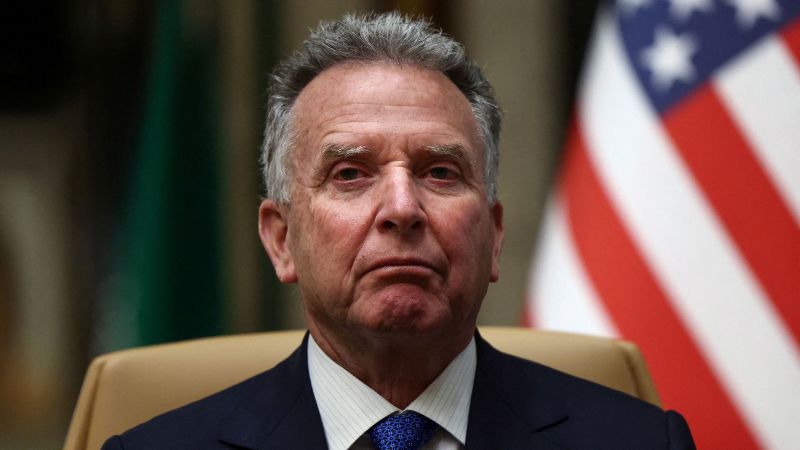**Steve Witkoff: The Unconventional Envoy in U.S. Diplomacy**
In recent days, a striking instance of diplomatic maneuvering unfolded as Steve Witkoff, a private real estate mogul and Middle East envoy, traversed from Abu Dhabi to notable global capitals like Doha and Moscow, eventually landing in Florida for a briefing with President Donald Trump regarding his discussions with Russian President Vladimir Putin. Witkoff’s whirlwind diplomatic efforts exemplify a new era of U.S. foreign policy, marked by personal trust over conventional expertise.
Witkoff’s rapid ascension into a pivotal role within Trump’s administration raises eyebrows, especially since his experience in government is almost nonexistent. His trust with Trump signifies that not many in the administration have the same level of confidence from the President, which further amplifies his unique standing. This situation presents serious questions about the efficacy and direction of U.S. foreign policy, as many wonder how traditional diplomats and advisors view his unilateral approach.
Despite his lack of government experience, Witkoff’s meetings—such as discussions with European and Ukrainian officials aimed at resolving the ongoing Ukraine War—demonstrate his willingness to engage directly in high-stakes diplomacy. His recent travels also included talks on Iranian nuclear negotiations, which underscores his expanding role on urgent global issues generally reserved for seasoned diplomats or secretaries of state.
Critics echo sentiments of skepticism regarding Witkoff’s capabilities given his backroom deals absent of conventional expertise. US officials have pointed out that his style diverges sharply from traditional diplomatic norms; Witkoff has been described as operating alone, sparking uncertainty about the broader implications of such unprecedented practices. While he has made inroads regarding foreign negotiations, results have been decidedly mixed: the Gaza truce remains elusive, peace efforts in Ukraine are stagnated, and relationships with Iran are still tenuous.
Marco Rubio, currently the Secretary of State, expressed considerable dissatisfaction regarding the lack of substantial progress in Ukraine. With mounting frustration, he emphasized that U.S. efforts might need to be reassessed if resolutions cannot be swiftly accomplished. This sentiment reflects concerns that an approach without appropriate checks and balances could potentially derail ongoing negotiations, highlighting the criticality of Witkoff’s role and its implications.
Witkoff enjoys a level of access to Trump’s inner circle reminiscent of his predecessor, Jared Kushner, also a family ally to Trump. His ability to bridge personal relationships into the political sphere has become a hallmark of his operation. He communicates directly with Trump almost daily, ensuring his influence in the administration remains consistent and persistent. This factional loyalty, while beneficial in terms of trust, can create disarray, particularly when he independently engages media channels or forms his foreign strategies without consulting traditional policy advisors.
In seeking to foster relationships abroad, Witkoff has found support from international officials who view his conversations as intrinsically valuable due to his connection to Trump. His dealings have been labeled as “efficient” but have simultaneously highlighted his relative inexperience, drawing both praise and doubt.
While Witkoff’s informal style has been categorized as pragmatic, it raises questions about the thoroughness of negotiations needed in complex scenarios like the Israel-Palestine conflict or the intricacies of nuclear diplomacy with Iran. His willingness to acknowledge his learning curve in diplomacy, as indicated by foreign officials, presents a dynamic of adaptability that could work in his favor; however, the stakes remain high for U.S. foreign policy credibility.
The long-term viability of Witkoff’s strategies has sparked conversations regarding the future of U.S.-Russia relations and how his unique background may shape ongoing negotiations. As he endeavors through sensitive engagements, Witkoff has intertwined personal relations with diplomatic responsibilities. His ties to Trump and proximity to White House dynamics bolster his confidence, but also tether him to criticism when perceptions of his expertise come into question.
Despite his growing responsibilities, the looming uncertainty surrounding Witkoff’s decisions prompts discussions on how he might develop or further rely on his small team to navigate potential international complications. Coupled with the challenges stemming from his position, it remains to be seen how Witkoff will carve out a lasting legacy and secure significant deals in a diplomatic landscape replete with intricacies and historical weight.
As the Biden administration grapples with ongoing foreign conflict and diplomatic intricacies, Witkoff’s ability to maintain equilibrium while finding innovative solutions will ultimately determine not just his tenure, but also the broader posture of U.S. foreign relations moving forward. As frustrations linger amidst continued attempts for resolution, the path laid out by this unconventional envoy will undoubtedly shape the narrative of the evolving diplomatic engagement.



